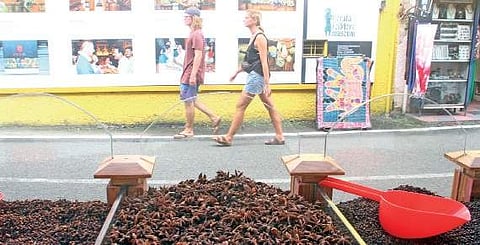

KOCHI: The fragrance of spices penetrates your senses as you step into the spice market of Mattanchery. However, the scent has lost some of its punch. The once bustling trade link to Ernakulam, Mattanchery now has less than five spice sellers. The emergence of other markets like the ones at Erattupetta in Kottayam, Paravur and Muppathadom in Aluva is being cited as one of the reasons behind the dip in trade.
Cochin Spice Market had a natural path of evolution.
Once it was the centre of trade for spices like pepper, turmeric and ginger. Not only the splitting up of the trade but also the arrival of curio shops has dealt a big blow to the spice market in Mattanchery. An increase in the labour cost too has affected the trade. Once the market was dominated by Gujarati and Jewish traders. There were over 65 of them a century back, but now only less than five are left. Jew town was the hub of spice trade till the early 1900’s.
It was the Gujarati’s who introduced Kerala spices to the world. The current Gujarati settlements can be traced back to the 1800’s. They held a monopoly over the trade for over a century. In the past two decades, however, the trade slowly slipped away from Mattanchery. Though Gujarati’s now have spice markets at Broadway as well, the hard fact that spice trade is declining is very much true.
“At one point, the dwindling trade forced spice traders to sell or shift their business or else turn to something entirely different. There is stiff competition and with the business declining, it has become more difficult to continue with the trade. The decreasing production in Kerala is fundamental cause,” said Arvind Shah, trader and spice trade agent.
“There has been an increase in import of spices from Vietnam and Sri Lanka. Also, a bumper crop (around 75,000 metric tonnes) is being expected at the production centres. This will help bring the price down in the market next year, which in turn will benefit the traders in Kochi,” said Bhavesh Vaid, spice trade agent.
“Over all the market is down. Ginger and pepper trade is down. But we expect a bumper crop from Kerala and Karnataka. It should help spice up the market,” said Hitesh Dattani, spices exporter.
At one point, the dwindling trade forced spice traders to sell or shift their business or else turn to something entirely different. There is stiff competition and with the business declining, it has become more difficult to continue with the trade. The decreasing production in Kerala is fundamental cause
- Arvind Shah, trader and spice trade agent
There has been an increase in import of spices from Vietnam and Sri Lanka. Also, a bumper crop (around 75,000 tonnes) is being expected at the production centres. This will help bring the price down in the market next year, which in turn will benefit the traders in Kochi
- Bhavesh Vaid, spice trade agent